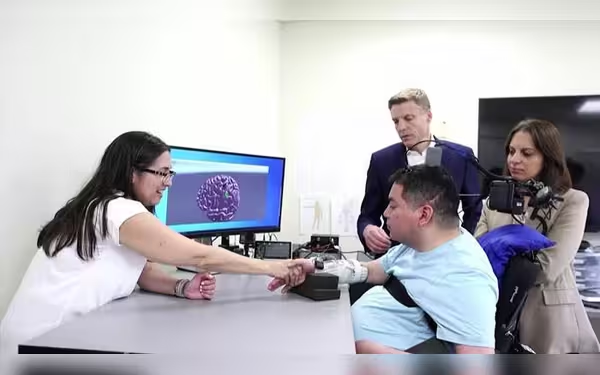Saturday, November 16, 2024 07:52 PM
Man Controls Amazon Alexa With Brain Implant Breakthrough
- 64-year-old man controls Alexa using brain implant.
- Technology enables thought-based interaction with devices.
- Ethical concerns arise with brain-computer interface advancements.
 Image Credits: thenews.com.pk
Image Credits: thenews.com.pkA 64-year-old man can now control Amazon's Alexa using a brain implant, showcasing advancements in brain-computer interface technology.
In a remarkable advancement in the field of neuroscience, a 64-year-old man has successfully gained the ability to control Amazon's Alexa using only his thoughts. This groundbreaking achievement is made possible through a brain implant that has been placed in a blood vessel on the surface of his brain. The technology, developed by the brain-computer interface company Synchron, allows the man to mentally "tap" icons on an Amazon Fire tablet, showcasing the incredible potential of brain-computer interfaces.
This innovative technology represents a significant leap forward in how humans can interact with machines. Traditionally, we have relied on physical inputs like keyboards, touchscreens, and voice commands to communicate with devices. However, with the introduction of brain implants, the possibility of controlling technology through thought alone is becoming a reality. This could open up new avenues for individuals with disabilities, allowing them to engage with technology in ways that were previously unimaginable.
In a similar vein, Neuralink, another company in the brain-computer interface space, made headlines earlier this year when it installed a brain implant in a man who was paralyzed following a diving accident. This demonstrates the growing interest and investment in technologies that bridge the gap between human cognition and digital devices.
The implications of such technology are vast. Imagine a future where individuals can control their smart homes, communicate with others, or even play video games simply by thinking about it. This could not only enhance the quality of life for many but also revolutionize the way we interact with the world around us.
However, as we stand on the brink of this new technological frontier, it is essential to consider the ethical implications and potential risks associated with brain implants. Questions about privacy, security, and the long-term effects of such devices on the human brain must be addressed. As we embrace these advancements, it is crucial to ensure that they are developed responsibly and with the well-being of users in mind.
The ability to control devices like Amazon's Alexa through thought alone is not just a fascinating scientific achievement; it is a glimpse into a future where technology and humanity are more intertwined than ever. As we continue to explore the capabilities of brain-computer interfaces, we must remain vigilant about the ethical considerations that accompany such powerful innovations. The journey ahead is filled with promise, and it is up to us to navigate it wisely.













